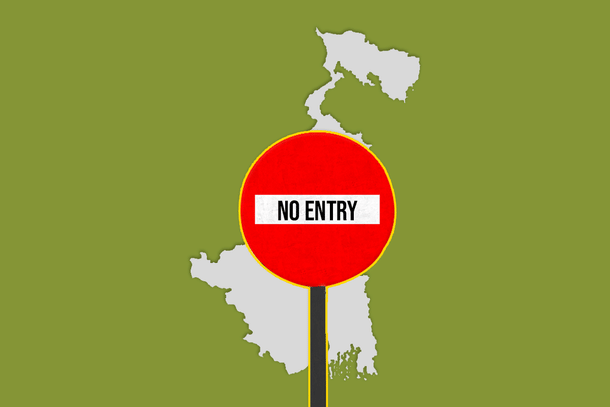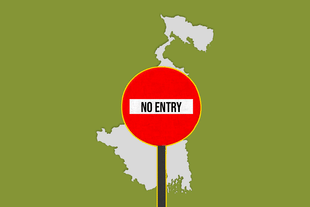World
Bengal’s Unilateral Move To Stop Movement Of Cargo Vessels On India-Nepal Border Riles Kathmandu
Jaideep Mazumdar
Jun 22, 2020, 03:52 PM | Updated 03:52 PM IST
Save & read from anywhere!
Bookmark stories for easy access on any device or the Swarajya app.


Bengal has unilaterally blocked the entry of trucks carrying tea and cardamom from Nepal at the border transit point of Kakarvitta in north Bengal.
Coming at a time when relations between the two countries have hit a very rough patch, this can cause further deterioration in ties.
According to this report in The Kathmandu Post, 22 trucks laden with tea and cardamom have been waiting at the Kakarvitta border for the past five days even after clearing all formalities with the Indian customs post at the border.
The Bengal police, which has a check-post after the Indian customs post, has not allowed the trucks to enter Bengal.
The news report quotes Dhruvaraj Bishwokarma, chief of the customs office on the Nepal side of the border, as saying that they have been informed that the Bengal police have been instructed not to allow entry of cargo trucks from Nepal.
That this is a unilateral action by the Bengal government is evident from the fact that movement of cargo continues normally through other trade and transit routes along the India-Nepal border in Bihar and Uttar Pradesh.
Indian customs officers say they had received clear instructions to allow movement of cargo vessels to and from Nepal, Bhutan and Bangladesh even during the lockdown and those orders stand.
By stopping the movement of cargo trucks from Nepal, the Bengal police are violating the India-Nepal trade agreement.
Of the 22 trucks whose entry into Bengal has been barred by the state police, 14 are laden with tea and the remaining with large cardamom.
The Bengal police only allowed trucks laden with broomsticks for export to Bangladesh and two trucks carrying cardamom destined for Delhi to pass through its check-post. This has given rise to suspicion that the Bengal government has acted under pressure from domestic traders and growers who are opposed to the entry of tea and cardamom into Bengal.
A powerful lobby of tea planters and traders have been asking for a ban on import of tea from Nepal.
According to Suresh Mittal, president of Nepal Tea Producers’ Association, Nepal tea is often mixed by unscrupulous Indian merchants with Darjeeling tea and exported to other countries.
Darjeeling tea has a GI (geographical indication) tag, but the tea produced in Nepal does not.
It is widely accepted that tea produced in Nepal, especially in Jhapa bordering the Darjeeling hills, is actually superior in quality than Darjeeling tea.
That’s because while the geographical conditions, including soil and climate, between Jhapa and Darjeeling are very similar, the tea bushes in Nepal are younger and thus yield better quality leaves.
The Darjeeling Tea Association (DTA) has been lobbying for a ban on entry of Nepal tea to India on the ground that the tea is packaged as ‘Darjeeling tea’ and sold in India and also exported.
This widespread practice, says the Association, depresses the price of genuine Darjeeling tea and also damages its reputation.
Nepal’s tea exports to India stood at Rs 63 crore in 2019.
DTA secretary Kaushik Basu said that the tea estates of Darjeeling have lost 45-50 per cent of their output year-on-year till June owing to the lockdown.
The first flush teas, which are mostly exported, have been lost completely (read this). Germany, UK, USA and Japan are major buyers of Darjeeling teas.
A little over half of the 7.8 to 8 million kilograms of tea produced in Darjeeling is exported.
But due to the global pandemic and the lockdown, this export is likely to hit rock bottom.
However, tea gardens in Nepal have not ceased tea production and the crop in Nepal, including the prized first flush, has been very good.
This has led to fears among Darjeeling planters that Nepal tea will capture the premium tea market in India and abroad.
“Many unscrupulous traders will sell and export Nepal tea as Darjeeling tea and that will deal a body blow to Darjeeling tea,” said Basu.
As for cardamom, the crop grown in Nepal is organic and considered to be superior in quality to the crop grown in the foothills of Bengal.
Thus, the cardamom grown in Bengal does not command a good price in the domestic Indian market.
And that is why cardamom growers of Bengal have been demanding a ban on entry of Nepal cardamom into the state.
But banning entry of Nepal’s tea and cardamom into Bengal not only violates the trade treaties between the two countries, but also WTO protocols.
If Bengal police continue to bar entry of goods trucks from Nepal into the state and Nepal lodges a complaint with the WTO, India will lose face and be slapped with penalties.
Bengal is a repeat offender in this regard.
The state government stopped movement of trucks to and from Bangladesh through Petrapole, the largest land port in Asia.
More than 2,000 trucks, some of them carrying essential goods and medicines, were stranded for over a month there.
The Bengal government cited widespread fear among locals that the coronavirus will spread if movement of trucks to and from Bangladesh is allowed.
Local Trinamool leaders had led protests at the border town of Bongaon that houses the Petrapole land port.
But, allege state BJP leaders, the actual reason was the truckers’ refusal to pay huge sums of money extorted from them by local Trinamool leaders.
BJP national secretary Rahul Sinha said that the truckers, operating on slim margins, had refused to meet the scaled up demands of the local Trinamool-led ‘syndicate’.
It took a number of stern letters to the Bengal government from the Union Ministry of Home Affairs (MHA) for movement of trucks to resume earlier this month.
MHA secretary Ajay Bhalla wrote to Bengal chief secretary Rajiva Sinha warning that the state was violating the Union government guidelines, legally binding international commitments and Articles 253, 256 and 257 of the Constitution of India.
Nepal’s exporters have written to the country’s federal government requesting it to take up the matter with the Indian government.
Jaideep Mazumdar is an associate editor at Swarajya.





